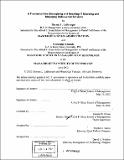| dc.contributor.advisor | Gabriel R. Bitran. | en_US |
| dc.contributor.author | LaBrecque, Thomas L. (Thomas Lynch), 1958- | en_US |
| dc.contributor.author | Yamada, Mitsushige, 1967- | en_US |
| dc.contributor.other | Massachusetts Institute of Technology. Management of Technology Program. | en_US |
| dc.date.accessioned | 2010-10-28T20:59:45Z | |
| dc.date.available | 2010-10-28T20:59:45Z | |
| dc.date.copyright | 2002 | en_US |
| dc.date.issued | 2002 | en_US |
| dc.identifier.uri | http://hdl.handle.net/1721.1/59544 | |
| dc.description | Thesis (M.B.A.)--Massachusetts Institute of Technology, Sloan School of Management, 2002 [first author]; and, (S.M.M.O.T.)--Massachusetts Institute of Technology, Sloan School of Management, Management of Technology Program, 2002 [second author]. | en_US |
| dc.description | Includes bibliographical references (leaves 76-81). | en_US |
| dc.description.abstract | This thesis is construed as a part of M.I.T. Sloan School project sponsored by a Fortune 500 company (hereafter referred as "The Company") to study disintermediation in the IT service industry. In this thesis we develop an integrated framework of IT outsourcing processes for enterprise users based upon our research findings. Each individual element is supported by a published, industry-accepted framework; what is unique is our integration of these accepted frameworks into a best practices model that supports customer firms through the entire IT lifecycle. In addition, we analyze future trends in IT outsourcing as to how enterprise needs will change over the next three to four years. To achieve these objectives, we've employed three research methods: literature review, in-person interview with corporate users, and a paper-based survey. The key to successful IT outsourcing lies in the establishment of a strategic partnership between a firm and its IT service provider. From client's point of view, there is no short cut or cookie-cutter method for successful outsourcing. People skills are the most demanded skills for successful outsourcing because human beings ultimately manage all technology. As hardware becomes a commodity, users see more value in customized IT solutions that help companies achieve business goals. IT service providers who can understand a client's business strategy and processes will be able to compete in higher tiers of the IT value chain. | en_US |
| dc.description.statementofresponsibility | by Thomas L. LaBreque and Mitsushige Yamada. | en_US |
| dc.format.extent | 87 leaves | en_US |
| dc.language.iso | eng | en_US |
| dc.publisher | Massachusetts Institute of Technology | en_US |
| dc.rights | M.I.T. theses are protected by
copyright. They may be viewed from this source for any purpose, but
reproduction or distribution in any format is prohibited without written
permission. See provided URL for inquiries about permission. | en_US |
| dc.rights.uri | http://dspace.mit.edu/handle/1721.1/7582 | en_US |
| dc.subject | Sloan School of Management. | en_US |
| dc.subject | Management of Technology Program. | en_US |
| dc.title | A framework for strategizing and deciding IT sourcing and managing outsourced services | en_US |
| dc.type | Thesis | en_US |
| dc.description.degree | S.M.M.O.T. | en_US |
| dc.description.degree | M.B.A. | en_US |
| dc.contributor.department | Management of Technology Program. | en_US |
| dc.contributor.department | Sloan School of Management | |
| dc.identifier.oclc | 50763935 | en_US |
